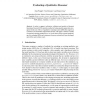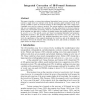AUSAI
1997
Springer
15 years 6 months ago
1997
Springer
In order to support verification, validation and analysis of dynamic Operations Research (OR) models a method of testing models against data is required. In the case of the QCM qu...
AUSAI
1997
Springer
15 years 6 months ago
1997
Springer
Learning genetic representation has been shown to be a useful tool in evolutionary computation. It can reduce the time required to find solutions and it allows the search process ...
AUSAI
1997
Springer
15 years 6 months ago
1997
Springer
110
click to vote
AUSAI
1997
Springer
15 years 6 months ago
1997
Springer
Engineering problem solving requires both domain knowledge and an understanding of how to apply that knowledge. While much of the recent work in qualitative physics has focused on...
116
click to vote
AUSAI
1997
Springer
15 years 6 months ago
1997
Springer
Co-ordination is the glue that binds the activities of autonomous problem-solving agents together into a functional whole. Co-ordination mechanisms for distributed problem-solving ...
127
click to vote
AUSAI
1997
Springer
15 years 6 months ago
1997
Springer
This paper describes a system that performs hierarchical error recovery, and detects and corrects a single error in a sentence at the lexical, syntactic, and/or semantic levels. I...
102
click to vote
AUSAI
1997
Springer
15 years 6 months ago
1997
Springer
Abstract. Autonomous agents decide for themselves, on the basis of their beliefs, goals, etc., how to act in an environment. However, it is often the case that an agent is motivate...
116
click to vote
AUSAI
1997
Springer
15 years 6 months ago
1997
Springer
Abstract. We compare Kripke models and hypercube systems, a simpli ed notion of Interpreted Systems, as semantic structures for reasoning about knowledge. Our method is to de ne a ...


